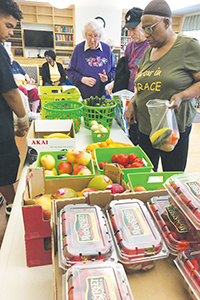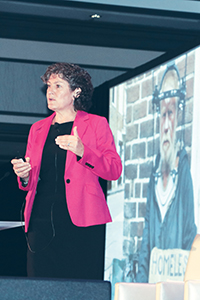By LISA EISENHAUER
CHICAGO — Going back to its origins among women religious, Catholic health care has extended beyond ministering to the sick. The foundresses were concerned with basic human needs including safe shelter, CHA President and Chief Executive Officer Sr. Mary Haddad, RSM, said at a recent conference on the nation's affordable housing crisis.

Residents participate in an onsite food pantry at a Mercy Housing community in Chicago. Catholic hospitals and health systems have partnered with Mercy Housing to increase access to affordable homes.
Courtesy Mercy Housing
"We weren't founded to provide health care," she said of congregations of women religious. "We weren't founded to provide education. It's very clear that sisters went in and said, 'What's the need and how do we best respond to that need in the community?'"
Sr. Mary shared her views on the Catholic health ministry's efforts to build respect for human dignity and serve the common good, at the closing plenary of Foundations for the Future of Housing. The conference, held Oct. 28-30 at the Renaissance Chicago Downtown Hotel, was sponsored by the Urban Institute, a Washington, D.C.-based think tank, and the John D. and Catherine T. MacArthur Foundation, a private organization that funds a variety of causes.
Sr. Mary pointed to efforts like those of her congregation, the Sisters of Mercy, who, in addition to caring for the health needs of people across the country, opened homes and started education programs for women and children in California during the cholera epidemic that broke out during the Gold Rush. "They were unstoppable in their work and in what they would do in providing care," she said of the Mercy sisters.
The socially minded vision of women religious and others who founded and grew Catholic hospitals and community-based programs for the poor across the nation has been embraced by executives who run today's large Catholic health systems, Sr. Mary said. Among the ways the sisters' work continues is through community benefit programs run by Catholic hospitals as a way to reach into their communities and get upstream of chronic health conditions.

Sr. Mary Haddad, RSM, CHA president and chief executive officer, discusses how the tradition among Catholic ministries of addressing social needs like housing traces back to the founders of Catholic health care in the United States. She was speaking on Oct. 30 at the Foundations for the Future of Housing conference in Chicago.
Catholic health care providers partner with Catholic Charities, Mercy Housing and other national and community organizations to help fund the construction of senior housing projects, neighborhood revitalization programs, and affordable housing units including housing for people with disabilities.
"The religious women in this country have done a significant job of influencing and creating a vision of how we need to work together in health care and housing for the future," she said.
The three-day conference brought together mission-driven housing providers, affordable housing policy advocates and their partners. Its stated goal was for participants to collaborate and come up with ways to increase housing access and affordability.
The closing plenary was titled "Galvanizing New Actors for Housing Collaboration." The focus was on bringing together prominent voices in philanthropy, advocacy and health care to share their hopes for the future and explain why better access to stable and affordable housing is central to achieving meaningful progress.
Sr. Mary shared the stage with Marian Wright Edelman, founder and president emerita of the nonprofit Children's Defense Fund; and Dylan Hayre, senior policy adviser with JustLeadershipUSA, a nonprofit that advocates for reducing the prison population. The moderator was Emily Badger, a reporter who covers urban issues for The New York Times.
Edelman emphasized the importance of keeping the nation's policymakers focused on the overall needs of children. She said the electorate must keep the pressure on decision makers to act as parents would by enacting laws and programs that strive to keep children safe, educated, housed and nourished.
Hayre focused on the intersection between the criminal justice system and the nation's social ills, including chronic homelessness. "If you have been incarcerated at least once in your life, compared to the general population, the chance of your experiencing homelessness is seven times higher," he said. "If you've been incarcerated two or more times, that likelihood goes up to 13 times higher than the general population."
He said the U.S. criminal justice system is based on "mass incarceration" and creates a cycle that victimizes the nation's already most marginalized populations — the poor and minorities — and gives them few options to find stable housing and become part of thriving communities.
All three plenary speakers agreed that collaboration between health care and social service providers is one of the keys to building strong communities and fostering wellness for all populations.
Sr. Mary said that despite the Catholic tradition of ministering to the whole person — body, mind and spirit — there had at times been a tendency among health care and social service providers to "silo the work we do" and not look at the bigger picture. She said that started to shift when reimbursements from insurers became more tied to chronic disease management and prevention.
Nowadays, providers of health care and social services recognize that "we have to start working together in order to be able to increase the health and wellness of the populations we serve," she said. "We're calling it population health."
And while the term "social determinants of health" has become a trendy one to explain root causes of chronic illness and poor health outcomes, Sr. Mary said members of the Catholic health ministry have long called on policymakers to do more to address issues like housing and income disparity to improve Americans' overall wellness.
She added that expanding awareness of those social issues and "raising the consciousness" of the nation and its leaders around the relationship between poverty and health status is imperative to being able to care for the communities that Catholic ministries serve.